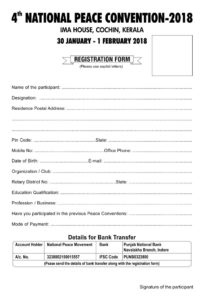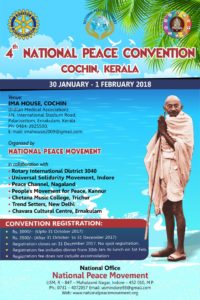
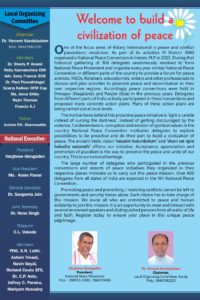
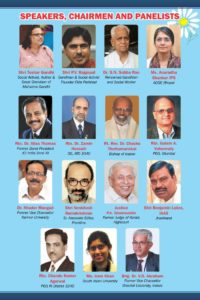
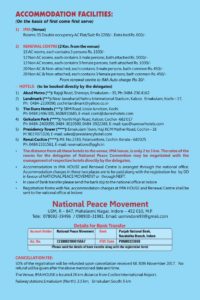
Kochi Peace Declaration, 2018
Preface
Realizing the urgent need for nurturing peace and harmony in the society, a National Peace Convention was organized by the Committee for Peace and Conflict Resolution/Prevention of Rotary District 3040 in 2015 in Indore. Besides members of the Rotary International, many individuals from different professions, including teachers and principals of many schools participated in the first National Peace Convention. At the end of the convention it was unanimously decided to launch a National Peace Movement. Fr. Varghese Alengaden was elected as the President of the National Peace Movement.
National Peace Movement consists of citizens from different parts of India and from different professions. Students and teachers also play key role in the National Peace Movement. National Peace Movement, in collaboration with Universal Solidarity Movement Indore, Rotary International and other organizations working for peace, has been organizing National Peace Convention every year since 2015. The second National Peace Convention was organized at Dimapur, Nagaland in 2016, the third convention in Goa in 2017 and the fourth one in Kochi in 2018. The fourth convention has decided to form state level units of National Peace Movement and organize state level conventions prior to the National Convention.
The National Peace Convention starts every year on 30th January, the death anniversary of Mahatma Gandhi, by paying tributes to Gandhiji and it is concluded on February 1. Throughout the convention the contribution of Gandhiji for peace is highlighted. One of the objectives of the Peace Convention is to disseminate the relevance of Gandhiji and his methods based on non-violence and forgiveness for conflict resolution and prevention.
Kochi Peace Declaration
When peace and harmony are disturbed and threatened in many parts of the world, particularly in our country, India, we, 372 delegates from 15 states of India, who are keen to nurture and promote peace and reconciliation, participated in the fourth National Peace Convention held from January 30th to February 1, 2018 at IMA House (Indian Medical Association) Kochi. We got energized and renewed our commitment to become peace makers. The convention was organized by National Peace Movement in collaboration with Rotary International Districts 3040 and 3201, Peace Channel Nagaland, Universal Solidarity Movement Indore, People’s Movement for Peace Kannur, Chetana Music College, Trichur, and Trend Setters, New Delhi. The Local Organizing Committee under the vibrant leadership of Dr. Vincent Kundukulam in perfect coordination with Rtn. Varghese Alengadan, the President of National Peace Movement, played a prominent role in making the convention fruitful and a spiritual experience. Participation and sharing by more than 50 students from different schools and colleges reflected the young India’s earnest desire to uphold India’s core civilizational value, ‘Vasudaiva Kudumbakam’.
Interaction with persons belonging to different states, religions, cultures and professions and exchanging views helped the participants to understand the peace building process. The fact that all participants paid towards the expenses of the convention, besides meeting the cost of their travel and accommodation shows their commitment to peace building.
Erudite and inspiring sharing by persons from various fields on different aspects of peace helped the participants to expand the horizon of their understanding of peace. Prominent among the speakers are 1) Dr. V. P. Gangadharan, a renowned cancer specialist and founder of Cochin Cancer Society 2) Srimati Anuradha Shankar IPS, Additional Director General of Police of Madhya Pradesh and a regular participant of National Peace Convention 3) Bishop Jacob Murickan, who donated his kidney to Hindu young man 4) Shri. Tushar Gandhi, social activist and great grandson of Mahatma Gandhi 5) Dr. Subba Rao, renowned Gandhian and a participant of Quit India Movement 6) Shri. P. V. Rajgopal, social activist, president and founder member of Ekta Parishad 7) Rtn. Varghese Alengadan, founder and national coordinator of Universal Solidarity Movement Indore 8) Shri. Venkitesh Ramakrishnan, Senior Associate Editor of the ‘Frontline’ magazine 9) Shri. Benjamin Lakhra IAAS, a writer and social activist fighting for the rights of the tribals, 10) Rtn. Gulam A. Vahanvaty, a Trustee of Rotary International 11) Ms. Iram Khan, a Ph. D student of International Law of South Asian University, New Delhi 12) Justice P. K. Shamsudddin, a great Gandhian and a noted humanitarian and 13) Shri. Jose Punnamparambil, a journalist and writer based in Germany.
The panellists, Dr. Scaria Kallor, a peace activist from Kannur, Dr. C P Anto, founder of Peace Channel, Nagaland, Ashish Franklin, the founder of ‘Aspire to Inspire’ youth organization and Dr. Jerry Joseph Pulickan, founder of ‘Home for Hope’ for providing free palliative care inspired the participants with their stories of making a difference. The innovative ideas shared by the student speakers delighted and enriched the participants.
Peace meditation guided by Dr. Paul Poovathinkal, an expert in Carnatic music, enabled the participants to experience peace within them at the beginning of the day.
We, the participants, reflected and discussed on peace from different perspectives such as:
- Mahatma Gandhi, a Role Model for building Peace and harmony
- “Poverty of Prosperity”.
- Moving beyond Identity for Peace and Universal Solidarity
- National Integration through Mahatma Gandhi
- Gender Equality for Peaceful Society
- Role of Media in Promoting Peace and Harmony
- Tribal Values in Building a Civilization of Love
- Rotary’s Role in Building International Peace
- Individuals and groups working for Peace and a Civilization of Love.
Our Significant Learning
- In order to become a peace maker one has to experience peace within himself or herself.
- Taking religion to politics and streets is detrimental to peace.
- Only by caring, sharing and making sacrifices one can contribute to nation building; mere slogan shouting is not patriotism.
- Liberty, equality, fraternity, sharing and communion are the core tribal values and they can definitely contribute to peace building.
- Religion is being used to keep the poor embroiled in a web of poverty and the ever increasing inequalities between the rich and the poor is a threat to peace and harmony. We should be ashamed of the phenomenon of increasing number of billionaires.
- When we rush after prosperity with greed we actually become poor.
- Respecting other religions by understanding them and empathizing with them is essential for peace.
- Gandhi bashing and multi-pronged attack on Mahatma Gandhi have become a fashion today in India; but by bringing back Gandhiji to the centre stage peace can be established not only in India but also in the world.
- “Transformative non-violence” is an excellent means for conflict resolution and prevention. The state should be non-violent in dealing with conflicts.
- Spirituality is seeing God in every human being and serving him/her.
- Education is to be made gender sensitive in order to make gender equality a reality.
- Peace is at present under siege not only in our country, but all over the world because human hearts are being walled up and the biggest enemy of peace is the differentiation between “we” and “they”.
- Wasting the resources is violence against nature and human beings.
- Instrumentation and manipulation of the media are being used today to fight wars; hence journalists have a great responsibility to expose the facts with details.
Fruits of the Convention
We, the participants reflected and discussed in state-wise groups about the ways and means for nurturing peace and arrived at the following action plan and suggestions to be implemented at the local and the national levels.
- a) Action Plan:
- State level peace conventions will be organized prior to the National Peace Convention. State Level committees will be formed for organizing the same.
- Programmes for promoting peace will be organized at the local level in collaboration with like-minded groups, especially the Rotary clubs.
- Peace clubs will be formed in schools and colleges for promoting peace.
- Gandhian values and principles will be disseminated among the students through various co-curricular activities. 2nd October and January 30th will be observed as peace day with special programmes on Mahatma Gandhi.
- Peace rallies will be organized by the participants in their respective locations, involving other like-minded organizations.
- One minute silence will be observed during the school assembly for world peace.
- In order to promote harmony among the followers of different religions, Inter-religious prayer with readings from different sacred scriptures will be conducted; quotations from all scriptures will be exhibited on the walls of institutions.
- For promoting the values of the Indian constitution posters of the preamble will be put up in prominent places of the institutions and public places.
- Conflict resolution skills will be imparted to the students, teachers and the youth through appropriate sessions/trainings.
- Students and teachers will be participating in the National Peace Convention.
Suggestions
- Use social media for promoting peace and sharing information about peace activities undertaken at the local and national levels.
- Make an appeal to the government to introduce peace education in the curriculum of the educational institutions and form a Ministry for Peace at the centre.
- Introduce study of all religions as part of value education in view of appreciating the universal values of all religions.
- Observe a ‘Constitution Day’ for disseminating the values of the Indian constitution, particularly pluralism, justice, liberty, equality and fraternity.
- Provide media education to the youth for viewing the media critically.
We, are grateful to all those who have contributed to make the 4th National Peace Convention a great opportunity for learning more about peace and experiencing peace and harmony.
Kochi February 1, 2018
